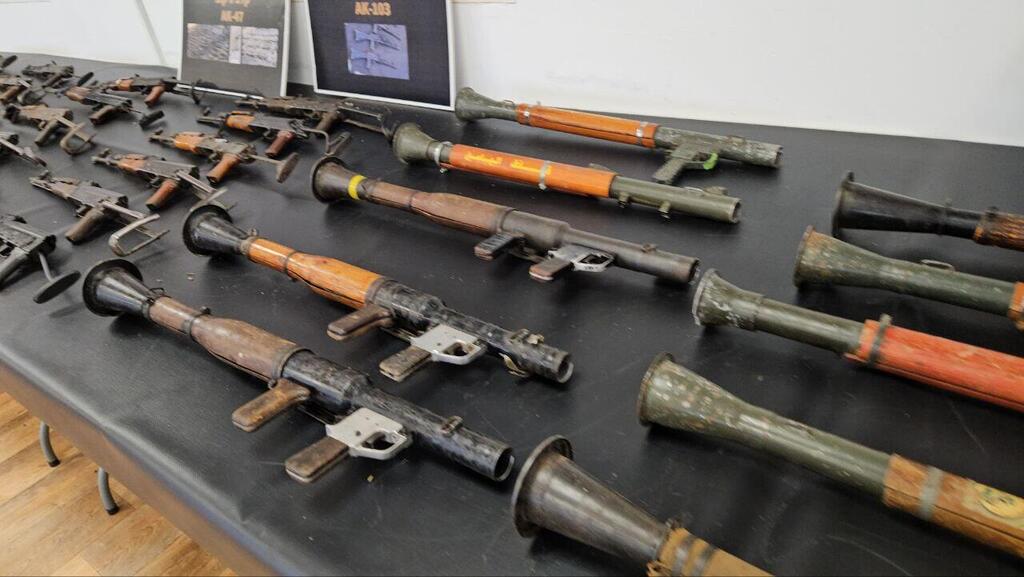Getting your Trinity Audio player ready...
Over the past two months of its ground campaign in southern Lebanon, the IDF has seized approximately 60,000 pieces of weaponry and military equipment from villages repurposed as Hezbollah strongholds, officials said Monday.
The seized items, processed by the IDF’s Trophy Unit in the Technology and Logistics Directorate (Atal), include firearms, combat vehicles, motorcycles, rocket launchers, anti-aircraft missiles and operational intelligence materials.
The spoils and vehicles of the Hezbollah terrorist organization captured by IDF forces in southern Lebanon
(Video: Yoav Zitun)
According to IDF sources, the haul represents less than half of the stockpiles uncovered in Hezbollah's staging areas near the Israeli border. For every four weapons caches removed by ground forces, approximately six more were destroyed in the field by forces. Among the 10,000 larger items seized are 40mm shells, rockets and anti-tank missiles. Smaller munitions, like rifle or machine-gun rounds, are counted by the crate.
The military is still deliberating how to handle the massive cache, which adds to hundreds of thousands of weapons and munitions uncovered during operations in Gaza. IDF officials noted a significant quality gap between the arsenals: Hezbollah’s weaponry is generally newer, standardized and effective, with much of it originating from Iran and Russia, while Hamas' arsenal is comparatively worn and improvised.
Despite the quantity of seized arms, the IDF has no plans to equip its forces with AK-47 rifles or RPG missile launchers, citing the risk of operational confusion and adherence to standard-issue weaponry. However, some materials, particularly explosives, are already being used in the field for destroying tunnels and weapons depots.
Among the notable finds were Iranian-made .50 caliber sniper rifles, capable of causing devastating injuries, designed as imitations of Austrian sniper rifles. Hezbollah’s vehicle fleet, also displayed Monday, included off-road ATVs for transporting arms and fighters, as well as larger jeeps and pickups retrofitted to carry rocket launchers, anti-aircraft missiles and mobile heavy machine guns.
20 tons of ammunition a day
Atal presented staggering data on military logistics and consumption during the war, now in its 13th month. Historically, both the IDF and government planned for wars lasting up to five weeks, but the current fighting has vastly exceeded those expectations.
Medical supplies for combat troops have cost NIS 280 million ($73 million) so far, equivalent to four years of supplies under normal conditions. Additionally, the IDF has supplied two million liters of water to troops in Gaza and consumed 157 million liters of diesel fuel and 500 million liters of jet fuel, primarily for aircraft in both northern and southern theaters.
IDF Technology and Logistics Directorate personnel in action in Gaza
(Video: IDF)
Since October 7, 160 factories producing food and textiles have been repurposed exclusively for military use. Transportation costs have surged dramatically, with the cost of airlifting one kilogram of goods for the IDF rising from $3–$4 pre-war to $17 due to aviation challenges.
Get the Ynetnews app on your smartphone: Google Play: https://bit.ly/4eJ37pE | Apple App Store: https://bit.ly/3ZL7iNv
Atal has supplied 15 million spare parts to combat units. Thousands of armored vehicles and trucks worn down by the prolonged fighting have been repaired, with 90% of vehicles damaged by IEDs or anti-tank missiles restored to operational status within an average of two and a half weeks. Over the past year, the IDF’s armored vehicles, including tanks and APCs, have logged 900,000 kilometers—four times the distance of an average year packed with drills and training.
The military has also repaired or replaced 8,150 engines, many in active combat zones in Gaza and Lebanon. For example, the readiness of armored vehicles and bulldozers in the 162nd Division, fighting continuously in Gaza since the war’s start, now stands at 85%. The number of mechanical repairs completed during ground operations in Gaza is equivalent to servicing the equipment of 13 entire divisions.
Atal's policy has prioritized direct support to front-line units, often at great cost. The logistics branch has suffered 97 fatalities and 2,200 wounded so far. It has conducted 2,000 logistical missions, replenished units 800 times, delivered 100 tons of supplies by air and sea and provided 1,600 living quarters for troops.
Daily, Atal distributes 20 tons of ammunition via 90 trucks, 300,000 liters of diesel, 15,000 liters of jet fuel and 500 equipment items to troops. The IDF has also procured 70,000 new tactical helmets and receives 70 drones daily to support combat operations.








